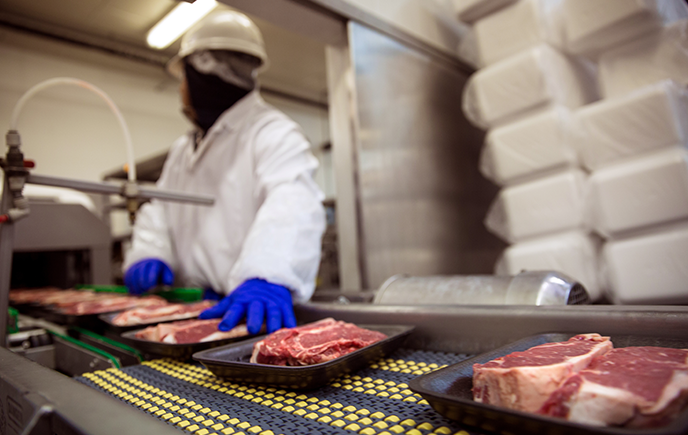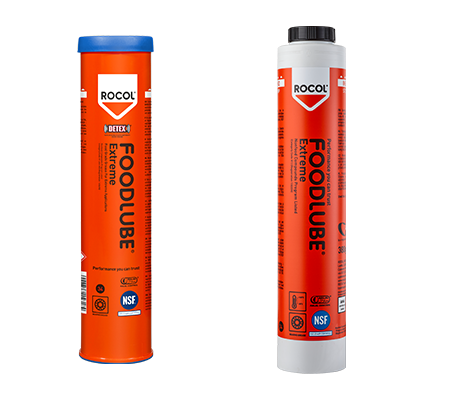Full steam ahead - Scottish distillery with Grundfos
There’s steam and there’s high-quality steam. There are pump solutions and intelligent pump solution...
If 2020 has taught us anything, it’s that contamination can come from the most unexpected sources. In a wet environment of the kind common in the meat and meat processing sectors, that source is bacterial contamination of the grease surface, which can lead to further contamination in the process.

Contaminated grease can lead to loss of production, to product recall and reputational damage, all having far-reaching consequences. Fortunately, there are easy ways to avoid it happening in your facility.
The food sector is clearly highly regulated. There are strict controls on which products can and can’t be used in areas where food is present.
The ingredients for these products are tested and audited, as are the products themselves. So, when food manufacturers use the correct, authorised products, then food safety is optimised.
The NSF public health and safety organisation sets the standards and tests the products. So, choosing NSF registered products will usually ensure safety in food manufacturing environments and processes.

However, in a sector such as meat processing, where operating conditions are harsh and contamination is virtually unavoidable, there is a clear case for going beyond NSF requirements – for the safety and protection of your customers, your output, and your brand.
Lubricants with incidental food contact need to be NSF H1 registered. But this classification has limitations which could cause problems.

In wet operating environments, bacteria are more likely to grow. This is particularly true in the meat industry, where bacteria are present on the meat itself. Give them the right conditions and even food grade grease can be a perfect breeding ground and become contaminated, leading to a range of problems.
A grease contaminated by bacteria may develop a different – or even foul – smell. It could become discoloured or grow visible mould. As it deteriorates due to contamination it may harden, or conversely become runny. In either case, its lubrication performance will be severely compromised.
The solution is ROCOL FOODLUBE Extreme grease, which:

A grease which becomes contaminated by bacteria is a grease with problems for your facility and your product.
It could contaminate product which then has to be scrapped or, if the product reaches the marketplace, recalled. Or it could cause the grease to deteriorate, with knock-on effects on the lubricated asset.
A grease which is not lubricating effectively will lead to greater wear and tear on bearings. This in turn will lead to more frequent bearing replacement. The grease itself will also need to be replaced or replenished more often, with cost and efficiency implications.

So increased noise, rattle or squealing from bearings, or a reduction in lubrication intervals, may be the result of contaminated grease. And if your solution is simply to replace the grease with more of the same, you’re not eliminating the problem but simply kicking it further down the road. The grease is highly likely to become contaminated again, to deteriorate again, and to cause the same problem again.
But change to ROCOL FOODLUBE Extreme grease which has an additive to protect itself from bacteria and the issues due to bacterial contamination will be significantly reduced, the resulting problems less likely, and performance, efficiency and productivity will all improve.
Certification by the American NSF Food Safety Division is usually clear proof that a product is safe for use in a food production or processing environment. But not always.
There are three important NSF classifications, but only two indicate suitability for food contact:
ROCOL FOODLUBE Extreme is not only H1 registered, but also fits in to HACCP and GMP plans, and is manufactured in a controlled environment. This makes it one of only a small handful of manufacturers to have ISO 21469 certification.
Get the latest updates from ERIKS including:
Choose any or all of these via the ERIKS Subscription Centre!
Our Know+How brings together the best of the latest Know+How Hub articles in one easy to digest magazine, covering the following topics:
That's why its the leading magazine for maintenance engineers from ERIKS.
Want Know+How Magazine delivered direct to your door? Visit the ERIKS Subscription Centre to opt-in!
Take a look at our latest updates...
There’s steam and there’s high-quality steam. There are pump solutions and intelligent pump solution...
Looking for a custom Product quote? Need an answer to a Technical question? Looking for Careers/HR support? Want to work with us? Interested in our Digital Trading solutions? Have a finance question? Send us your enquiry and a member of the ERIKS team will be with you quickly.
We strive to deliver exceptional quality service and products. As part of this goal, we encourage customers to submit feedback on their experiences so we can resolve any issues and concerns.
At ERIKS we strive to deliver the best quality service and products. As part of this goal we encourage customers to submit feedback on their experiences so we can resolve any issues and concerns.
Call us: +441215086000
